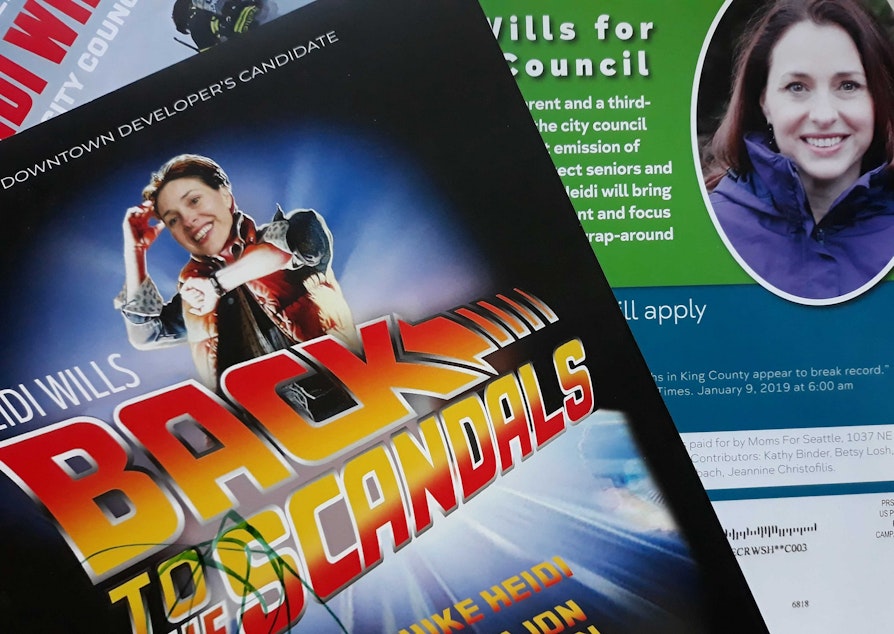'Outrageous spending' in Seattle council races, Jayapal, González say

Some of Seattle’s elected leaders are condemning Amazon’s campaign spending in city council races, and seeking laws to restrict future campaign spending by businesses.
Seattle Congresswoman Pramila Jayapal calls Amazon’s recent infusion in the city’s council races "outrageous" and "disrespectful" of the elections process.
"This latest $1.1 million poured into the elections by Amazon two short weeks before the election is truly outrageous and I’m getting asked about it not just in Seattle but across the country,” Jayapal said.
“Just this morning I was on a number of national morning shows when a commentator said to me privately, ‘Wow, did Amazon really put $1 million into buying your elections two weeks before the election?’ Sadly I had to say ‘yes,’" she said.
"In my perfect world, and in my legislation, I make it clear that none of these super PACs should exist," she said, referring to political action committees. "We should have publicly funded and capped elections that give real voice to the people.”
Rachel Lauter, executive director of Working Washington, said spending by pro-business PACs has far outstripped spending by organized labor PACs in most council districts.
Sponsored
Lauter said candidates endorsed by the Seattle Metropolitan Chamber of Commerce have benefited from $2.9 million in independent expenditures, while non-chamber candidates have together received $886,000.
The candidates endorsed by the chamber are: Phil Tavel, Mark Solomon, Egan Orion, Alex Pedersen, Debora Juarez, Heidi Wills and Jim Pugel.
Those not endorsed by the chamber are: Lisa Herbold, Tammy Morales, Kshama Sawant, Shaun Scott, Dan Strauss and Andrew Lewis.
The lion’s share of that amount was spent by the hotel workers’ union on behalf of Andrew Lewis in District 7.
Sponsored
Lauter said the open seat in District 6, which includes Fremont and Ballard, is currently the most expensive race in the city. She said donors have spent more than $1 million for Heidi Wills, in direct donations to her campaign and outside spending.
She said that amounts to more than $32 per likely voter. Her opponent Dan Strauss has received about $340,000 in donations and outside spending.
Jayapal and Seattle City Council member Lorena González said they are working to challenge the unlimited outside spending unleashed by the 2010 U.S. Supreme Court’s Citizens United ruling.
Jayapal said she believes that political donations by union workers are different from those by corporate executives. But she said “I do think overall we should not have super PACs in general."
Jayapal has proposed a constitutional amendment to restrict political spending.
Sponsored
“I would like to get to a system where we have publicly funded elections and that’s what the legislation I’ve been sponsoring is about,” she said.
González, who is not up for reelection, called Amazon’s attempt to sway the election a “test case” that the company and others would “copy and paste” to influence local races around the country if successful.
González said she will propose what she’s calling the Clean Campaigns Act in Seattle, to govern local elections. She said it would “abolish super PACs,” and ban donations to political action committees by corporations with a percentage of foreign ownership.
In response, business donors say they are longtime contributors to local levies and ballot measures, and accuse the elected officials of being selective in condemning the spending in city council races.
Amazon spokesman Aaron Toso said González fails to acknowledge the contributions of Unite Here and Service Employees International Union that come from outside Washington State.
Sponsored
“We are proud to participate in our local elections and have a history of supporting issues important to the community, including the Families, Education, Preschool and Promise Levy campaign to support education, supporting transit investments through Sound Transit 3, and defending transportation funding in the No on I-976 campaign," he said in a statement. "Given the lack of criticism of the hundreds of thousands of dollars that out-of-state groups have contributed in our community’s local elections, this sounds like a proposed ban on supporting candidates or issues with whom Councilmember Gonzàlez may disagree.”
The Seattle Metropolitan Chamber of Commerce said their donors believe the current city council isn’t “making progress on our city’s biggest challenges.”
Sponsored
In a statement, Markham McIntyre, executive director of the Chamber’s PAC, the Civic Alliance for a Sound Economy, said, “Businesses made major donations to the (Sound Transit) campaign, as well to local levy campaigns for transportation, education, and housing, and we’re involved in two important statewide measures this year.”
He said that includes $2.8 million to defeat I-976, Tim Eyman’s proposal for $30 car tabs that would take funding away from transit projects, and spending more than $1 million to support I-1000 which would reauthorize affirmative action in the state.
“Once the business community highlighted the need for change and a functioning Seattle City Council, our contributions suddenly became an issue,” McIntyre said.
“Elections are up to voters – and we encourage voters to decide for themselves whether they want four more years of dysfunction and ineffectiveness from their city council.”
González countered that business donors tend to support property tax measures rather than tax reform.
Sponsored
“What they fail to mention is that they backed those proposals because they are property taxes,” González said. “Property taxes are disproportionately borne by the middle class in our city and by the poor, not by the super wealthy and elite and certainly not by corporations.”
In response Amazon pointed to a City of Seattle report listing them as the city's largest property taxpayer.
González said she plans to introduce her campaign finance legislation November 12 and seek passage in January, under the new council.




